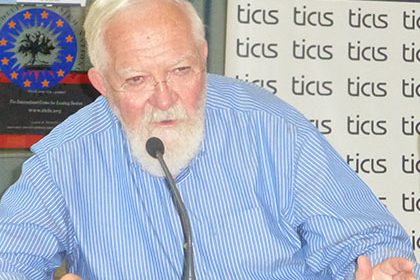
Thank you for including us in the 3rd Chania-Med Forum on Economy, Energy, Politics & Power that took place in Crete this past July 23-26.
We appreciate the opportunity you have provided over the past twenty years in the International Center for Leading Studies to so many students who will become specialists and to mature specialists to exchange views on contemporary issues. And to discover essential, enduring aspects of the Greek spirit during the beautifully conceived day trip after the Forum.
It has been said that “All art was once contemporary” and that “The Greeks invented everything and left it up to us to work out the details.”
In the garden of Epicurus the concept of the atom was born, it was picked up by Lucretius in his De Rerum Natura, the Atomic Age began on July 16, 1945, and we continue to work out the details such as was done during the Forum this past July.
The campus of the Mediterranean Agronomic Institute of Chania, like the garden of Epicurus, is an ideal locus amoenus for the growth, bloom, and leisurely exchange of ideas. We forget in our busy world that the words such as school, Schule, scuola, école and so forth have all risen out of the ancient Greek word for leisure. Thinking best occurs in space and not under the duress of time. In this regard our campus at the University of Kansas, sprawling out over Mount Oread that rises up above the oriented grid of the town of Lawrence, lends itself to Socratic dialogues and Aristotelian peripatetics. I was so pleased that one of structures on the Chania campus bears the name of Thalia, one of the nine daughters of Mnemosyne and muse of comedy and pastoral poetry, and one of those many lively, generative spirits celebrated by Hesiod who tickle our fancy out of which bubbles eudaemonism.
Towards the end of our informative bus trip where we found ourselves deep into one of the gorges of the mountains of Crete, a young man from Iraq and I had a wonderful conversation about plants and growing (his father is a professional gardener and he showed me on his telephone gardens in Baghdad) beginning with the discussion of plane trees needing water by the Resistance museum and then the thoughtful implications of the plane tree leaning over a millstone set in a stone trough and a dry stone basin. Earlier that day we saw at the entrance of another memorial a trio of poplar trees whose vigorously waving leaves produce a gamut of human sounds: sighing, weeping, laughing, and applauding as they have since time immemorial.
How moving to see young participants in the program this past July, who came from various countries, smiling and gathered together within the embrace of an ancient olive tree between 3,000 and 5,000 years old.
The final program of the 3rd Chania-Med Forum on Economy, Energy, Politics & Power, July 23-26, 2015 sets down the letters of the topics that that were to be covered during the various sessions that took place during several days, and transcriptions of the presentations and debates that followed may well serve as documentation for the future, but what we all will retain from our participation in the Forum of the International Center for Leading Studies on the campus of the Mediterranean Agronomic Institute of Chania is a certain spirit.
Sincerely,
Ted Johnson
Professor Emeritus of French and Humanities, University of Kansas
Lawrence, Kansas, 66046, U. S. A.


